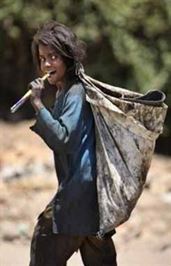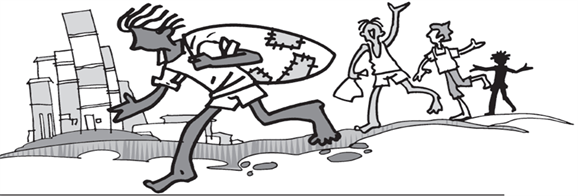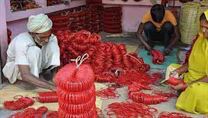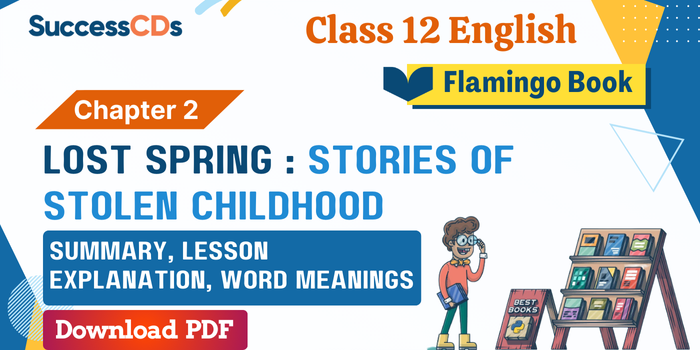CBSE Class 12 English Lesson 2 Lost Spring: Stories of Stolen Childhood Summary, Line by Line Explanation along with Difficult Word Meanings from Flamingo Book
Lost spring: Stories of Stolen Childhood – Here is the Class 12 English Flamingo Book Lesson 2 Lost spring Summary and detailed explanation of the lesson along with meanings of difficult words
Chapter 2 Lost Spring Class 12
- The Lost Spring Summary
- The Lost Spring Summary in Hindi
- Lost Spring: Stories of Stolen Childhood Previous Year Questions with Model Answers PDF
- Theme of the Lesson
- Lost Spring Stories of Stolen Childhood Explanation
- Lost Spring Stories of Stolen Childhood Part 1 Video Explanation
- Lost Spring Stories of Stolen Childhood Part 2 Video Explanation
Related:
- The Lost Spring Important Question Answers
- Lost Spring: Stories of Stolen Childhood Character Sketch
- Lost Spring Stories of Stolen Childhood Previous Years Question with Answers
The Lost Spring Summary
Summary of The Lost Spring – Stories of stolen Childhood – The author tells us stories of her interactions with children from deprived backgrounds. She describes their poor condition and life in an interesting manner. The story touches the reader and is thought-provoking.
The author described two of her encounters with children from deprived backgrounds. Through them she wants to highlight the plight of street children forced into labour early in life and are denied the opportunity of schooling. Also, she brings out the callousness of society and the political class towards the sufferings of the poor. The first encounter is with a rag picker boy named Saheb – E – Alam who migrated from Bangladesh in 1971 and lives in Seemapuri in Delhi. These ragpicker children look for ‘valuables’ in the garbage – things like a coin or torn shoes which are as precious as ‘gold’ for them.
They could hardly manage some food for themselves, other things like identity, education, shoes and sports are their unfulfilled dreams. Their parents scrounged the garbage searching for things that helped them survive – afford food, clothing and shelter for the family. The children hunted through the garbage heaps looking for things which could partially fulfil their unfulfilled dreams.
One day the writer saw the boy, holding a steel can, going towards the milk booth. He had got a job at a tea stall. He was happy that he would get eight hundred rupees and all the meals. The writer noticed that Saheb had lost the freedom of being his own master which he had enjoyed as a rag picker.
The second boy was Mukesh who belonged to a family of bangle makers in Firozabad. The boy had a dream of becoming a car mechanic. On the contrary, his family was traditionally engaged in bangle making, although the profession harmed them physically and they hardly earned any money out of it.
Still, no one dared to dream of doing something else due to the fear of the police and the middlemen. The family elders were content that other than teaching the art of bangle–making to their children, they had been able to build them a house to live in. The boy wanted to be a car mechanic. Cars were all that Mukesh had seen on the roads of his town and so, he could not dream any further.
The Lost Spring Summary in Hindi
द लॉस्ट स्प्रिंग – स्टोरीज़ ऑफ़ स्टोलेन चाइल्डहुड” की लेखिका अनीस जंग हमें वंचित पृष्ठभूमि के बच्चों के साथ अपनी बातचीत की कहानियां सुनाती है । वह उनकी खराब स्थिति और जीवन का दिलचस्प तरीके से वर्णन करती है। कहानी पाठक को छूती है और विचारोत्तेजक है।
लेखक ने वंचित पृष्ठभूमि के बच्चों के साथ अपनी दो मुलाकातों का वर्णन किया है। उनके माध्यम से वह सड़क पर रहने वाले उन बच्चों की दुर्दशा को उजागर करना चाहती हैं जिन्हें जीवन में जल्दी श्रम करने के लिए मजबूर किया जाता है और उन्हें स्कूली शिक्षा के अवसर से वंचित कर दिया जाता है।
साथ ही वह समाज और राजनीतिक वर्ग के लोगों की गरीबों के प्रति बेरुखी को सामने लाती है।
पहली मुलकत साहेब-ए-आलम नाम के एक कूड़ा उठाने वाले लड़के के साथ है जिसका परिवार 1971 में बांग्लादेश से पलायन कर गया और दिल्ली के सीमापुरी में रहता है। ये कचरा उठाने वाले बच्चे कचरे में ‘मूल्यवान’ चीजें जैसी की सिक्के या फटे जूते की तलाश करते हैं जो उनके लिए ‘सोने’ जितनी कीमती होती हैं।
वे मुश्किल से अपने लिए कुछ खाने का प्रबंध कर पाते हैं , पहचान, शिक्षा, जूते और खेल जैसी अन्य चीजें उनके अधूरे सपने हैं। उनके माता-पिता कचरे की छानबीन करते हैं जिससे उन्हें जीवित रहने में मदद मिलती है – परिवार के लिए भोजन, कपड़े और आश्रय का खर्च पूरा करने के लिए पैसे जुटाने के चक्कर में वे कचरे के ढेर से चीज़ें इकठी कर बेचते हैं ।
बच्चे कचरे के ढेर में से ऐसी चीजों की तलाश में थे जो उनके अधूरे सपनों को आंशिक रूप से पूरा कर सकें।
एक दिन लेखक ने लड़के को स्टील का डिब्बा पकड़े दूध के बूथ की ओर जाते देखा। उसे एक चाय की दुकान पर नौकरी मिल गई थी। वह खुश था कि उसे आठ सौ रुपये और पूरे दिन का खाना मिल जाएगा। लेखक ने देखा कि अब साहेब ने अपना खुद के मालिक होने की स्वतंत्रता खो दी थी, जिसका आनंद उसने एक कूड़ा उठाने वाले के रूप में लिया था।
दूसरा लड़का मुकेश था जो फिरोजाबाद में चूड़ी बनाने वाले परिवार से ताल्लुक रखता था। लड़के का कार मैकेनिक बनने का सपना था। इसके विपरीत, उनका परिवार पारंपरिक रूप से चूड़ी बनाने में लगा हुआ था, हालाँकि पेशे ने उन्हें शारीरिक रूप से नुकसान पहुँचाया और उन्होंने मुश्किल से कोई पैसा कमाया। यह पेशा न तो उन्हें कमाई देता बल्कि उनकी सेहत भी खराब कर देता।
फिर भी पुलिस और बिचौलियों के डर से किसी की हिम्मत नहीं हुई कि वह कुछ और करने का सपना देखे।
परिवार के बुजुर्ग इस बात से संतुष्ट थे कि अपने बच्चों को चूड़ी बनाने की कला सिखाने के अलावा, वे उनके रहने के लिए एक घर बनाने में सक्षम थे।
लड़का कार मैकेनिक बनना चाहता था। वाहन ही थे जो मुकेश ने अपने शहर की सड़कों पर देखे थे और इसलिए, वह उस के आगे कोई और सपना नहीं देख सकता था। अगर उसने आसमान में हवाई जहाज़ देखा होता तो शायद वो पायलट बनने का सपना भी देख लेता।
Lost Spring: Stories of Stolen Childhood Previous Year Questions with Model Answers PDF
Download the previous year questions of the Lesson Lost Spring: Stories of Stolen Childhood of class 12 English for free. With the help of this, you can prepare for the exam.
To Download Lost Spring: Stories of Stolen Childhood Previous Year Questions with Model Answers- Click Here
The Lost Spring Theme
The sad position of poor children who are forced to have a wretched life and forgo the fun times of childhood due to their social circumstances is the subject of the story “Lost Spring.” These children are compelled to labour from an early age and are not given the opportunity to pursue an education. Anees Jung, the writer, makes a concerted effort to end child labour. She advocates for government enforcement of strict laws prohibiting child work as well as enforce the education of children. The word was spread so that child exploitation might be stopped and all children could enjoy their happy, springtime days. She talks about her encounter with a slum dweller kid named Saheb-e-Alam who is a ragpicker and wishes to play tennis and go to a school. However, these wishes remain unfulfilled. Another boy named Mukesh hails from a family of bangle makers from Firozabad. Their lives are miserable because the profession does not provide a good livelihood and harms them physically too. The boy dreams to do something different but his dreams are restricted to the life that he has seen in his hometown. He aspires to become a car mechanic.
Top
The Lost Spring Explanation Notes
Story 1 – ‘Sometimes I find a Rupee in the garbage’

Passage: “Why do you do this?” I ask Saheb whom I encounter every morning scrounging for gold in the garbage dumps of my neighborhood. Saheb left his home long ago. Set amidst the green fields of Dhaka, his home is not even a distant memory. There were many storms that swept away their fields and homes, his mother tells him. That’s why they left, looking for gold in the big city where he now lives.
Word Meaning
Scrounging – searching for
Amidst – in the middle of
Explanation of the above Passage: Every morning, the writer sees a young ragpicker boy who visits the garbage dump near her house and searches for ‘gold’ in it. The writer says that he searches for ‘gold’ ironically because although the garbage dump is full of useless, thrown away things, still he shuffles it so minutely as if he will get something as precious as ‘gold’ from it. The boy’s name is Saheb. His home in Dhaka was in the middle of lush green fields. They had left it many years ago and he does not remember it anymore. His mother had told him that there were many storms that destroyed their homes and fields. So, they left home and shifted to the cities in search of ‘gold’. The writer again says, “looking for gold in the big city”. Gold here refers to something precious which was not available in their hometown. Things like shoes, money, bags, etc. for the children and food, clothing, shelter as means of survival for their parents. The boy searches for such precious things in the garbage dumps. One day the writer questions Saheb and asks him the reason for shuffling through the garbage.
Passage
“I have nothing else to do,” he mutters, looking away.
“Go to school,” I say glibly, realizing immediately how hollow the advice must sound.
“There is no school in my neighborhood. When they build one, I will go.”
“If I start a school, will you come?” I ask, half-joking.
Word Meaning
Mutters – to speak in a low voice
Glibly – speaking or spoken in a confident way, but without careful thought or honesty
Hollow – meaningless
Explanation of the above Passage: Saheb replies to the writer that he has nothing else to do other than rag picking. The writer suggests that he should go to school. She realizes that her advice is meaningless for the poor boy. He replies that there are no schools in the area where he lives. He also assures her that he will go to school when one is built near his house. The writer asks him jokingly that if she opened a school would he attend it.
Passage “Yes,” he says, smiling broadly. A few days later I see him running up to me. “Is your school ready?”
“It takes longer to build a school,” I say, embarrassed at having made a promise that was not meant. But promises like mine abound in every corner of his bleak world.
Word Meaning
Embarrassed – feeling ashamed
abound – exist in large numbers
bleak – empty
Explanation of the above Passage: Saheb says that he would join the writer’s school and after a few days, he runs up to her to ask whether her school is ready. The writer replied that it takes a lot of time to build a school. She felt ashamed at making a false promise. She had said this as a joke and had never intended to open a school, so she felt ashamed of herself. Saheb was not hurt because he was used to such false promises as they existed in large numbers in his empty world. He was surrounded by such false promises made by everyone around him. His world was empty as no promise made to Saheb was ever fulfilled.
Top
Lost Spring Stories of Stolen Childhood Class 12 Video Part 1 Explanation
Passage: After months of knowing him, I ask him his name. “Saheb-e-Alam,” he announces. He does not know what it means. If he knew its meaning — lord of the universe — he would have a hard time believing it. Unaware of what his name represents, he roams the streets with his friends, an army of barefoot boys who appear like the morning birds and disappear at noon. Over the months, I have come to recognize each of them.

he would have a hard time believing it – it would be difficult for him to believe that his name meant ‘the Lord of the Universe’
Word Meaning
barefoot – wearing nothing in the feet
Explanation of the above Passage: The writer had known Saheb for a few months when she asked him his name. He replied as if he was making an announcement that his name was Saheb – E – Alam. The writer thought that the boy did not know the meaning of his name and if he came to know that his name meant “Lord of the Universe” he would not be able to believe it. His name was opposite to his life. He went around the streets with a group of friends. It was like an army of boys who did not wear any footwear. They appeared in the morning like the morning birds and disappeared at noon. The writer could recognize all of them as she had been seeing them for the past few months.
Passage:
“Why aren’t you wearing chappals?” I ask one.
|“My mother did not bring them down from the shelf,” he answers simply.
Lost Spring Stories of Stolen Childhood Class 12 Video Part 2 Explanation
The writer asked one of them that why was he not wearing any footwear. The boy simply replied that his mother did not get them down from the shelf. As they were beyond his reach, he did not wear them

“Even if she did he will throw them off,” adds another who is wearing shoes that do not match. When I comment on it, he shuffles his feet and says nothing. “I want shoes,” says a third boy who has never owned a pair all his life. Travelling across the country I have seen children walking barefoot, in cities, on village roads. It is not lack of money but a tradition to stay barefoot, is one explanation. I wonder if this is only an excuse to explain away a perpetual state of poverty.
Word Meaning
Shuffles – slides them over each other
excuse – a reason to justify a fault
perpetual state of poverty – never-ending condition of being poor
Explanation of the above Passage: Another boy who was wearing a different shoe in each foot said that even if his mother would have given him the footwear, he would have thrown it away. He meant that the boy was not wearing footwear because he did not want to wear one. The writer asked the second boy the reason for wearing a different shoe in each foot. He did not reply and shuffled his feet as he tried to hide the shoes. A third boy spoke that he was eager to get a pair of shoes as he had never owned one all his life. The writer takes the example of shoes to highlight the condition of these boys. They search the garbage dumps looking for such precious things. She further tells us that as she travelled across the country, she had seen many children walking barefoot in the cities as well as the villages. They reasoned that they were barefoot not due to lack of money to buy footwear, but being barefoot was a tradition for them. The writer wondered and concluded that the reason of it being a tradition was a mere excuse to hide the fact that they were so poor that they could not afford footwear.
Passage: I remember a story a man from Udipi once told me. As a young boy he would go to school past an old temple, where his father was a priest. He would stop briefly at the temple and pray for a pair of shoes. Thirty years later I visited his town and the temple, which was now drowned in an air of desolation. In the backyard, where lived the new priest, there were red and white plastic chairs. A young boy dressed in a grey uniform, wearing socks and shoes, arrived panting and threw his school bag on a folding bed. Looking at the boy, I remembered the prayer another boy had made to the goddess when he had finally got a pair of shoes, “Let me never lose them.” The goddess had granted his prayer. Young boys like the son of the priest now wore shoes. But many others like the ragpickers in my neighborhood remain shoeless
Word Meaning
Desolation – the state of being empty
Panting – taking short and quick breathes
Explanation of the above Passage: The writer narrates a story told to her by a man from Udipi. (Udipi is a town in Karnataka). When he was a young boy, he would walk to his school. On the way, he would cross a temple where his father worked as a priest. He would stop at the temple and pray to God to bless him with a pair of shoes. After thirty years the writer visited the town and the temple. Now the place was nearly empty. The new priest lived in the backyard of the temple. Plastic chairs in red and white colour were kept there. A young boy came running. He was wearing grey coloured school uniform, socks and shoes. He had a school bag hung on his shoulders. He threw it on the bed and ran away. The writer wants to say that the financial position of the priest at the temple had improved over the last thirty years. Now, he could afford shoes for this children. She was reminded of another boy who got a pair of shoes. He prayed to the goddess that he may never lose the shoes that he had got. The goddess had granted his prayer as the boy never lost his footwear. This shows us that the underprivileged value anything that they get because they have been longing for it.


Passage: My acquaintance with the barefoot ragpickers leads me to Seemapuri, a place on periphery of Delhi yet miles away from it, metaphorically. Those who live here are squatters who came from Bangladesh back in 1971. Saheb’s family is among them. Seemapuri was then a wilderness. It still is, but it is no longer empty. In structures of mud, with roofs of tin and tarpaulin, devoid of sewage, drainage or running water, live 10,000 ragpickers.
Word Meaning
Acquaintance – contact
periphery- outer area
metaphorically–symbolically
squatters – a person who unlawfully occupies an uninhabited building or unused land
wilderness- a wasteland
tarpaulin- heavy-duty waterproof cloth
Explanation of the above Passage: The writer describes the area where these rag picker boys live. Seemapuri, located on the outskirt of Delhi was very different from the capital of the country. In 1971 when these rag pickers had migrated from Bangladesh, the area had been a wasteland. Seemapuri was still a wasteland but now it was not empty as almost ten thousand rag pickers lived there in structures made of mud, with roofs made of thin sheets of tin or plastic material called tarpaulin. There was no sewage, drainage or running water facility in Seemapuri. They lived in unhygienic conditions. It was a piece of wasteland where the garbage of the city was collected. These people had started living there illegally.
Passage: They have lived here for more than thirty years without an identity, without permits but with ration cards that get their names on voters’ lists and enable them to buy grain. Food is more important for survival than an identity. “If at the end of the day we can feed our families and go to bed without an aching stomach, we would rather live here than in the fields that gave us no grain,” say a group of women in tattered saris when I ask them why they left their beautiful land of green fields and rivers.
Word Meaning
Permits – legal documents
Tattered – torn
Explanation of the above Passage: The ragpickers had been living illegally in Seemapuri for the last thirty years. They have occupied the area without government permission or ownership. The politicians of the area have provided them ration cards and voter identity cards. They got grocery for their family through these ration cards and in return, they cast their votes in favour of the politician who had helped them. The writer asked a group of women who were wearing torn saris that why did they leave their homes in Dhaka. They replied that if they were able to satisfy the hunger of their families and sleep well at night, they were happier to live in Seemapuri than their fields in Dhaka which were ruined and gave them no food.
Passage: Wherever they find food, they pitch their tents that become transit homes. Children grow up in them, becoming partners in survival. And survival in Seemapuri means rag-picking. Through the years, it has acquired the proportions of a fine art. Garbage to them is gold. It is their daily bread, a roof over their heads, even if it is a leaking roof. But for a child it is even more.
Word Meaning
Transit homes – a temporary home
Explanation of the above Passage: These people travelled in search of food and wherever they found it, they set up temporary homes and started living there. Their children kept on growing there and gradually, they also started helping their parents in seeking means of survival. For those who lived in Seemapuri, the means of survival was rag picking. As they had been doing it for many years, they became trained at rag picking and did it well. For the rag pickers the garbage was as precious as gold. These families searched the garbage dumps and got things which they sold to fund their food. They gathered torn or damaged sheets which were used to cover the roof of their homes. These did not cover them well but still provided them with some protection. For the children, the garbage dumps were more than a means of survival.
Passage: “I sometimes find a rupee, even a ten-rupee note,” Saheb says, his eyes lighting up. When you can find a silver coin in a heap of garbage, you don’t stop scrounging, for there is hope of finding more. It seems that for children, garbage has a meaning different from what it means to their parents. For the children it is wrapped in wonder, for the elders it is a means of survival.
Word Meaning
Lighting up – show joy and happiness
Explanation of the above Passage: Saheb was happy to say that sometimes he found a rupee and even a ten – rupee note in the dump. As one often finds even a silver coin in the garbage dump, he kept on searching hoping to find more. For the children, the garbage dump was a means of fulfilling their dreams although partially while for their parents, it was a means of aiding survival by providing the basics – food, clothing and shelter.

Passage: One winter morning I see Saheb standing by the fenced gate of the neighbourhood club, watching two young men dressed in white, playing tennis. “I like the game,” he hums, content to watch it standing behind the fence. “I go inside when no one is around,” he admits. “The gatekeeper lets me use the swing.”
Word Meaning
Content – satisfied
Explanation of the above Passage: One winter morning the writer saw Saheb standing by the fence of a club. He was watching a tennis game being played by two young men. Saheb liked the game but could not play it. He told the writer that he went inside the club when it would be closed. He was allowed to take swings by the guard there.
Passage: Saheb too is wearing tennis shoes that look strange over his discolored shirt and shorts. “Someone gave them to me,” he says in the manner of an explanation. The fact that they are discarded shoes of some rich boy, who perhaps refused to wear them because of a hole in one of them, does not bother him. For one who has walked barefoot, even shoes with a hole is a dream come true. But the game he is watching so intently is out of his reach.
Word Meaning
Discarded – thrown away
Bother – worry
Explanation of the above Passage: The writer saw that Saheb was also wearing tennis shoes. They did not look appropriate with his dress which was worn out and had faded. He told the writer in an attempt to justify himself that someone gave him the shoes. She however figured out that he had got them from a garbage dump. They must have been thrown away by a boy from a rich family as he did not want to wear them anymore. Probably they had a hole or two in them due to which he did not want to wear them. On the contrary, Saheb was not bothered by this fact and had no problem wearing them as he could not afford anything better than that. He walked barefoot and to wear a shoe even with a hole was like a dream for him. Although due to the garbage dump, Saheb’s dream of wearing shoes had been partially fulfilled but his desire to play tennis would never be fulfilled.
Passage: This morning, Saheb is on his way to the milk booth. In his hand is a steel canister. “I now work in a tea stall down the road,” he says, pointing in the distance. “I am paid 800 rupees and all my meals.” Does he like the job? I ask. His face, I see, has lost the carefree look. The steel canister seems heavier than the plastic bag he would carry so light over his shoulder. The bag was his. The canister belongs to the man who owns the tea shop. Saheb is no longer his own master.
Explanation of the above Passage: One morning the writer met Saheb who was on his way to the milk booth. He was holding a steel container. He told her that he had got a job at the nearby tea stall. He would earn eight hundred rupees a month and get meals too. The writer asked him if he liked the job as she could see that he had lost the carefree look. As now Saheb was working for someone else and was carrying his master’s container, he was burdened with responsibility. Earlier, as a rag picker, Saheb would carry his own bag and was his own master. Now, he was no longer his own master.
Story 2 – “I want to drive a car”
Passage: Mukesh insists on being his own master. “I will be a motor mechanic,” he announces.
The writer met a boy named Mukesh who aspired to become a motor mechanic.
“Do you know anything about cars?” I ask.
She asked him if he knew anything about cars.
“I will learn to drive a car,” he answers, looking straight into my eyes. His dream looms like a mirage amidst the dust of streets that fill his town Firozabad, famous for its bangles. Every other family in Firozabad is engaged in making bangles. It is the centre of India’s glass-blowing industry where families have spent generations working around furnaces, welding glass, making bangles for all the women in the land it seems.
Word Meaning
looking straight into my eyes – with confidence and determination
looms like a mirage – seems that it will be true in the future but actually it will not be so
amidst – in the middle of
glass-blowing industry – industry related to making glass
furnaces – a closed room or container where heat is produced
welding – the process of joining metal or glass pieces by heating them
Explanation of the above Passage: The boy was confident and replied that he would learn to drive a car. His dream was far away from reality and although the boy was confident, he would succumb to the societal pressures. He lived in Firozabad which was famous for glass bangles. The writer felt that the boy’s dreams would not materialize and gradually get influenced by the dusty streets of Firozabad. She wanted to say that as every family in the town of Firozabad was involved in the glass bangle industry, so would Mukesh do with the passage of time. She tells us that Firozabad was the main town of India for the glass – blowing industry. The families had been involved in working at furnaces, welding glass, and making bangles for generations. They made so many bangles that it seemed that they made bangles for all the women of the world.
Passage: Mukesh’s family is among them. None of them know that it is illegal for children like him to work in the glass furnaces with high temperatures, in dingy cells without air and light; that the law, if enforced, could get him and all those 20,000 children out of the hot furnaces where they slog their daylight hours, often losing the brightness of their eyes.
Word Meaning
Dingy – dark, dim
Slog – work hard
Daylight hours – hours of the day when there is sunlight
Brightness of their eyes – here, refers to the power to see
Explanation of the above Passage: Mukesh’s family was also involved in the profession of glass bangle – making. They were not aware of the law. They did not know that it was unlawful to force children to work in such glass furnaces. The work places were hot, dark closed rooms without ventilation. The writer felt that if the law would come into force, it would rescue almost twenty thousand children from these inhuman places where they were forced to work hard during the daytime. They often ended up losing their eyesight also.
Passage: Mukesh’s eyes beam as he volunteers to take me home, which he proudly says is being rebuilt. We walk down stinking lanes choked with garbage, past homes that remain hovels with crumbling walls, wobbly doors, no windows, crowded with families of humans and animals coexisting in a primeval state. He stops at the door of one such house, bangs a wobbly iron door with his foot, and pushes it open.
Word Meaning
Beam – shine brightly
Volunteers – freely offers to do something
Stinking – bad smell
Choked – blocked
Hovels – slums
Crumbling – falling down
Wobbly – unsteady
Coexisting – present at the same time and place
Primeval – prehistoric
Bangs – hits
Explanation of the above Passage – Mukesh was happy as he took the writer to his home. He felt proud as he informed her that it was being renovated. They walked down streets which were full of garbage and gave foul smell. The streets were lined with slums which were unsteady. The walls were falling apart, the doors were unsteady, there were no windows and were full of families where people lived along with animals. They reminded the writer of the prehistoric man who lived just like animals. Mukesh stopped in front of one such door, hit it hard with his foot and pushed it open.
Passage: We enter a half-built shack. In one part of it, thatched with dead grass, is a firewood stove over which sits a large vessel of sizzling spinach leaves. On the ground, in large aluminium platters, are more chopped vegetables. A frail young woman is cooking the evening meal for the whole family. Through eyes filled with smoke she smiles. She is the wife of Mukesh’s elder brother. Not much older in years, she has begun to command respect as the bahu, the daughter-in-law of the house, already in charge of three men — her husband, Mukesh and their father.
Word Meaning
Shack – a roughly built hut
Thatched – covered with dry grass
Vessel – container for cooking food
Sizzling – make a hissing sound when frying or cooking
Platters – large plates
Chopped – cut finely
Frail – thin, weak
eyes filled with smoke – her eyes are filled with the smoke coming out of the firewood stove
command respect – she is worthy and so, is respected
Explanation of the above Passage: The house where Mukesh lived was partially constructed hut. In one corner was a firewood stove made with dead grass. A vessel with spinach leaves was kept on it. on the ground There were more plates with chopped vegetables in them. There was a thin, young woman cooking the evening meal for the family. Her eyes were full of the smoke emanating from the stove but she was still cheerful and smiled to see the writer. She was the wife of Mukesh’s elder brother. Although she was not much older than Mukesh, she was a responsible person and was worthy to get respect from the family as the daughter-in-law of the family. She took care of three men – her husband, Mukesh and their father.
Passage: When the older man enters, she gently withdraws behind the broken wall and brings her veil closer to her face. As custom demands, daughters-in-law must veil their faces before male elders. In this case the elder is an impoverished bangle maker. Despite long years of hard labour, first as a tailor, then a bangle maker, he has failed to renovate a house, send his two sons to school. All he has managed to do is teach them what he knows — the art of making bangles.

Word Meaning
Withdraws – goes back
Veil – a piece of fine material worn by women to protect or hide the face, cover or hide
Impoverished – very poor
Labour – hard work
Renovate – repair
Explanation of the above Passage: As Mukesh’s father entered the house, the daughter-in-law hid behind the wall and covered her face behind her veil. It was a tradition for the daughter-in-laws to hide their face in the presence of the older male members of the family. The elder here was a poor bangle maker. He had worked hard all his life – first as a tailor, then as a bangle maker. He was still not able to either renovate the house or send his sons to school. He had just managed to teach him the skill of making bangles.
Passage: “It is his karam, his destiny,” says Mukesh’s grandmother, who has watched her own husband go blind with the dust from polishing the glass of bangles. “Can a god-given lineage ever be broken?” she implies.
Word Meaning
Destiny – fate
God-given lineage – here, a profession carried on through the generations of a family – glass bangle making
Explanation of the above Passage: Mukesh’s grandmother justified her son by saying that he was destined to make bangles as it had been their family profession. She had seen her husband become blind due to the dust from polishing the glass bangles. She said that their family had got this art of bangle making from God and so they had to carry on the tradition.
Passage: Born in the caste of bangle makers, they have seen nothing but bangles — in the house, in the yard, in every other house, every other yard, every street in Firozabad. Spirals of bangles — sunny gold, paddy green, royal blue, pink, purple, every colour born out of the seven colours of the rainbow — lie in mounds in unkempt yards, are piled on four-wheeled handcarts, pushed by young men along the narrow lanes of the shanty town.
Word Meaning
Yard – the open area at the back of the house
Mounds – heaps
Unkempt – not taken care of
Piled – kept one on top of the other
Shanty town – a town that is full of small, roughly built huts
Explanation of the above Passage: They were born in a particular caste which had to follow the profession of bangle making. All their life they had just seen these glass bangles. They were everywhere – in the backyard, in the next house, in their yard and even in the streets of the town. There were huge spiral bunches of bangles in different colours like gold, green, blue, pink, purple. There were bangles of all the colours of the rainbow. Further, the writer says that there were bangles in the neglected yards also. They were dumped on handcarts for sale. They were pushed by men along the streets of Firozabad.
Passage: And in dark hutments, next to lines of flames of flickering oil lamps, sit boys and girls with their fathers and mothers, welding pieces of coloured glass into circles of bangles. Their eyes are more adjusted to the dark than to the light outside. That is why they often end up losing their eyesight before they become adults.
Word Meaning
Welding – joining
Explanation of the above Passage: The writer describes the environment where these bangle makers work. They were small, dark huts. The children would sit next to a line of oil lamps whose flames were unsteady. They, along with their parents joined the pieces of coloured glass into circles called bangles. As they spent a lot of time in the dark, their eyes would not adapt to the bright sunlight. Many of them lost their eyesight before gaining adulthood.
Passage: Savita, a young girl in a drab pink dress, sits alongside an elderly woman, soldering pieces of glass. As her hands move mechanically like the tongs of a machine, I wonder if she knows the sanctity of the bangles she helps make. It symbolizes an Indian woman’s suhaag, auspiciousness in marriage.
Word Meaning
Drab – faded, colorless
Soldering – joining
Tongs – an instrument with two moveable arms joined at one end
Sanctity – the state of being sacred or holy
Auspiciousness – good omen
Explanation of the above Passage: There was a young girl by the name of Savita. She wore a faded pink coloured dress. She was sitting with an elderly woman and they were joining pieces of glass to make bangles. Her hands moved like a machine just like the tongs of a machine. The writer wondered if Savita knew that bangles were sacred. They were a good omen for a woman’s wifehood.
Passage: It will dawn on her suddenly one day when her head is draped with a red veil, her hands dyed red with henna, and red bangles rolled onto her wrists. She will then become a bride. Like the old woman beside her who became one many years ago. She still has bangles on her wrist, but no light in her eyes.
Word Meaning
Dawn on her – she will realize
Draped – covered
Explanation of the above Passage: She thought that Savita would realize this when she would become a bride. That day she would cover her head with a red coloured veil, colour her hands with henna and wear red coloured bangles on her wrist. The elderly woman sitting next to Savita also became a bride many years ago. She was still wearing the glass bangles but had lost her eyesight now.
Passage: “Ek waqt ser bhar khana bhi nahin khaya,” she says, in a voice drained of joy. She has not enjoyed even one full meal in her entire lifetime — that’s what she has reaped! Her husband, an old man with a flowing beard, says, “I know nothing except bangles. All I have done is make a house for the family to live in.”
Word Meaning
Ser – a unit of measuring quantity
Reaped – received as a benefit
Explanation of the above Passage: The elderly woman complained that she had not eaten even a ser of food. Ser is a unit of measuring quantity. The woman wants to say that they are so poor that they cannot eat enough food. That is the benefit that she has received by adopting the profession of bangle-making. The woman’s husband has a flowing beard. He says that he does not know anything other than bangle – making. All that he has been able to accomplish is to make a house for his family to live in.
Passage: Hearing him, one wonders if he has achieved what many have failed in their lifetime. He has a roof over his head!
Explanation of the above Passage: The writer wonders that probably the old man has achieved something which many other people have not been able to achieve. At least he has been able to secure a shelter for his family.
Passage: The cry of not having money to do anything except carry on the business of making bangles, not even enough to eat, rings in every home. The young men echo the lament of their elders. Little has moved with time, it seems, in Firozabad. Years of mind-numbing toil have killed all initiative and the ability to dream.
Word Meaning
Rings – a sound which is repeated
Echo – repeat
Lament – complaint
Mind – numbing – boring
Toil – physical hard work done to earn a living
Explanation of the above Passage: This problem was prevalent in all the homes which carried on the profession. They did not know anything else other than bangle-making and it did not even provide them enough to eat. The young men who had entered the traditional profession also had the same complaint. With the passing time there was no improvement in their condition. As they had been doing hard work for a countless number of years, they did not have any ability to do something else or to dream of it.
Passage: “Why not organise yourselves into a cooperative?” I ask a group of young men who have fallen into the vicious circle of middlemen who trapped their fathers and forefathers. “Even if we get organised, we are the ones who will be hauled up by the police, beaten and dragged to jail for doing something illegal,” they say. There is no leader among them, no one who could help them see things differently. Their fathers are as tired as they are.
Word Meaning
Vicious – cruel
Hauled up – dragged, taken away
Explanation of the above Passage: The writer suggests them to form a cooperative. She talked to a group of young men to get out of the clutches of the cruel middlemen who had trapped their elders. The men said that if they dared to do something like that, they would be dragged and beaten up by the police and sent to jail. Their acts would be termed to be unlawful. The writer felt that as they had no leader, they could not think of doing things differently. They all were so tired – the men and their fathers.
Passage: They talk endlessly in a spiral that moves poverty to apathy to greed and to injustice. Listening to them, I see two distinct worlds — one of the family, caught in a web of poverty, burdened by the stigma of caste in which they are born; the other a vicious circle of the sahukars, the middlemen, the policemen, the keepers of law, the bureaucrats and the politicians. Together they have imposed the baggage on the child that he cannot put down. Before he is aware, he accepts it as naturally as his father. To do anything else would mean to dare.
Word Meaning
Spiral – here, a never-ending continuous process
Apathy – lack of concern
Greed – intense and selfish desire for something
Distinct – separate
Stigma – dishonor
Bureaucrats – government officials
Imposed – forced upon
Baggage – burden
To dare – do something courageous
Explanation of the above Passage: The men complained that it was a continuous process. Their poor condition led to lack of concern for their problems. This made them greedy and led to injustice. The writer envisioned that there were two separate worlds – one was of such families who were stuck in poverty and the pressure of doing the traditional profession according to the caste in which they were born. The other world is a never-ending cycle of moneylenders, middlemen, policemen, law keepers, government officials and politicians. Both of these worlds had forced the young boys to follow the family traditions. The young boys get into the profession and become a part of the vicious cycle even before they realize it. If they did anything else, it meant that they were challenging these two worlds.
Passage: And daring is not part of his growing up. When I sense a flash of it in Mukesh I am cheered. “I want to be a motor mechanic,’ he repeats. He will go to a garage and learn. But the garage is a long way from his home. “I will walk,” he insists. “Do you also dream of flying a plane?” He is suddenly silent. “No,” he says, staring at the ground. In his small murmur there is an embarrassment that has not yet turned into regret. He is content to dream of cars that he sees hurtling down the streets of his town. Few airplanes fly over Firozabad.
Word Meaning
Hurtling down – moving around
Explanation of the above Passage: The boys had not been reared up to be bold so that they could dare to go against the system. The writer was happy to sense that Mukesh had the spark in him. He repeated that he would be a motor mechanic. He wanted to go to a garage and learn the job. The writer asked that as the garage was at a distance from his home, Mukesh insisted that he would walk up to it. She asked him if he dreamt of flying planes. The boy became silent and refused. He did not know about them as he did not know about planes. Not many planes flew over Firozabad. As he had only seen cars moving around in Firozabad, his dreams were restricted up to them.
Class 12 English Important Links
Also See:
CBSE Class 12 English Notes, Lesson Explanation
CBSE Class 12 English MCQ Question Answers
Class 12 English Flamingo Book Chapter wise word meaning
Class 12 English Flamingo Poems Word meaning
Class 12 English Vistas Book Word meanings
CBSE Class 12 English Important Question Answers
Character Sketch of Class 12 English
Class 12 English Core Previous Year Question Answers (2019-2024) Chapterwise
Class 12 English Core Previous Year Question Paper with Solutions 2019-2024



